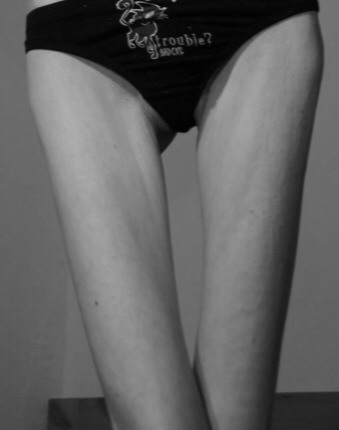
My 16-year-old sister emerged from her nest of a room. Her hair was matted and last night’s makeup sat dusty on her cheeks. She scuffed past the kitchen table and plopped in front of the communal computer. The screen went blue as her Tumblr feed loaded. After all, Sundays are a day of worship.
“Oh my God, she’s so skinny! I wish I had a thigh gap,” she whined into her iPhone. My sister skipped breakfast and continued on her quest for “thinspiration.”
I first encountered thinspo (short for thinspiration) a few years ago. The blogs are commonly run by teens who plaster pictures of wafer-thin girls and pro-anorexia quotes to encourage weight loss.
Pro-ana and thinspo communities have existed since the invention of the Internet, they got their start on random forums and message boards like Yahoo. However, it wasn’t until Tumblr that these blogs became common on many teen’s laptops. The blogging platform has peaked to over 300 million users.
Tumblr is a powerhouse platform due to its ease of sharing photos and posts all while finding hundreds of bloggers with similar interests. It’s like having an online diary that someone actually wants to read.
“These kinds of blogs begin to glamorize and normalize eating disorders rather than treating them as a mental illness. When we have an attitude that anorexia or bulimia is normal, or just a part of growing up, then we are dismissing the fact that anyone struggling has a need for help,” said Catherine Moar, a UNB nursing student who works with It’s Not About Food, a group for students with eating issues.
The realm of thinspo seemed to take a dive in 2012 after Tumblr banned blogs that “actively promote self-harm” including “blogs that glorify anorexia, bulimia and other eating disorders.” Other social media top dogs Twitter and Instagram also enforced the ban.


Regardless, a quick thinspo Google still unveils a thriving society of will power and beauty in the form of bones.
Jesse MacNeil is one 16-year-old who is still partaking in the trend and has created a thinspo of his own.
Like every devoted thinspiration preacher, MacNeil posts an updated record of his current weight and his goal weight. The young blogger stands at just over six feet tall and weighs in at 115 pounds. According to standards for healthy body mass index, MacNeil is underweight.
“I started a thinspo because I was overweight when I was younger and have been obsessed with weight ever since. I just want to be skinny,” said MacNeil. “I repost pictures that appeal to me. When I see those pictures I’m like, ‘Man, I want to look like that.’”
MacNeil promotes the images, but recognizes how damaging these posts can be.
“They are sending false hope by saying that when you achieve the weight that you want then you’ll be happy. I know I won’t be happy,” said the blogger.
For people like MacNeil, the thinspo world is more than concave ribs and Kate Moss. As you dive further down the Tumblr rabbithole, the blogs become a sea of comfort and support.
“Eating issues are very secretive, which is why they are so deadly,” said Moar, of It’s Not About Food. “However, on these thinspiration and pro-ana website, eating issues are normalized. It’s a place where you can get acceptance and share with others.”
The UNB It’s Not About Food group has held sessions on the pressures to be thin on social media. A group member recently admitted a big step in their recovery from an eating disorder was to quit following all thinspo blogs.
“We need to replace these blogs with self-love ones,” said Moar.
More commonly, thinspos are being swapped out for fitspos. Most fitspos (short for fitspiration) promote exercise and a healthy lifestyle. Pictures of unattainable bodies are replaced with people of all sizes.
Sharee Samuels started her fitspiration as a way to share her story of losing 120 pounds the healthy way. Her 10,000 followers get full access to recipes and workouts for beginners to advanced.
“People believe that if you lose weight you will start to love yourself. It doesn’t work that way, if you don’t love yourself before, you wont love yourself after,” said Samuels.

